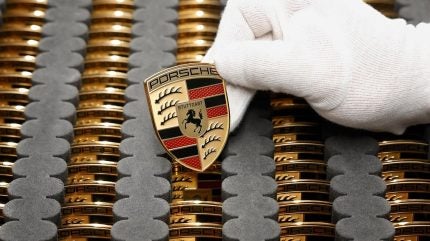
Volkswagen Group said that it foresees a €5.1bn ($5.98bn) impact on its operating profit for the year 2025, as its subsidiary Porsche announced postponements in the launch of new all-electric models.
Porsche said that current models, such as the Panamera and Cayenne, will continue to be offered with combustion engines and plug-in hybrids for the foreseeable future, extending into the 2030s.

Discover B2B Marketing That Performs
Combine business intelligence and editorial excellence to reach engaged professionals across 36 leading media platforms.
In its revision, Porsche has recalibrated its medium-term profit targets for the Volkswagen Group, reducing the expected return on sales from the previously anticipated range of 15-17% to a more conservative 10-15%.
The adjustment comes as part of Porsche’s planning cycle for the years 2026 through 2030.
Furthermore, Porsche has opted to abandon a joint vehicle project with Volkswagen Group in its initial form, opting instead for an approach with “greater flexibility” in the drivetrain systems.
In its statement, Porsche said “due to the delayed ramp-up of electric mobility, the market launch of certain all-electric vehicle models is planned to take place at a later date”.
“In particular, the development of the planned new platform for electric vehicles in the 2030s is to be rescheduled. The platform is to be technologically redesigned in coordination with other brands within the Volkswagen Group,” it added.
Porsche’s pivot, along with the write-downs on capitalised project costs and additional provisions, has led the Volkswagen Group to revise its group operating return on sales forecast for the fiscal year 2025.
The delay in the rollout of the new EV platform is expected to result in depreciation and provisions, which Porsche anticipates will affect its operating profit in 2025 by up to €1.8bn.
Volkswagen Group will also feel the repercussions of these developments, as it is set to record a non-cash impairment charge of approximately €3bn on the goodwill allocated to Porsche, affecting the group’s operating result for the current year.
Additionally, the altered vehicle project and Porsche’s reduced annual forecast will collectively create a one-off negative effect of around €2.1bn on Volkswagen Group’s operating result in 2025.
As a result of these combined factors, the Volkswagen Group has adjusted its operating return on sales expectations for the 2025 fiscal year to a range of 2-3%, down from the previously projected 4-5%.
The group’s net cash flow in the automotive division is now anticipated to be around €0bn, a decrease from the earlier estimate of €1 to 3bn.
However, the forecast for net liquidity has been slightly adjusted to around €30bn, from the initial range of €31 to €33bn.
The group’s sales revenue forecast remains unchanged, expected to be on par with the previous year’s level.
In consideration of these financial adjustments, the group executive board has expressed its intention to exclude the non-cash impairment charge related to Porsche’s goodwill when calculating the basis for the 2025 dividend payment, which will be payable in 2026.
Porsche and Volkswagen CEO Oliver Blume said: “We are currently experiencing massive changes within the automotive environment. That’s why we’re realigning Porsche across the board.
“In doing so, we want to meet new market realities and changing customer demands – with fantastic products for our customers and robust financial results for our investors.”
Earlier in the month, Volkswagen’s works council head Daniela Cavallohas heightened calls for Oliver Blume to relinquish one of his two leadership roles within the company.






